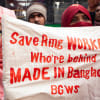Workers are right to decry poor wages

We're deeply troubled by the continuing RMG wage crisis that, in the absence of mitigating measures, has seen both owners and workers pushed to opposite extremes. The workers' protests—which started after factory owners' representatives at the minimum wage board proposed a wage of Tk 10,400 against the demand for Tk 20,393 by workers' representatives—rumbled on through Thursday, too, as agitating workers demonstrated in various places in Gazipur and Ashulia. On their part, many owners responded by closing factories, with the number of such factories reaching 421 by Thursday afternoon, as per an estimate by Prothom Alo. In Dhaka's Mirpur area, where there are around 235 factories, a good number of them have been closed, too.
Such closures have a direct bearing on the workers, not to mention the health of the industry itself. Under Section 13(1) of the labour law, which the BGMEA decided to impose on Wednesday, workers do not get paid if they do not work. The provision also allows owners to withhold payment if workers participate in "illegal" strikes. We must say that while we do not condone violence, we do not believe in countering extremes with extremes either. It only begets more resentment, which will further destabilise the industry. Of course, most protesting workers just want their legitimate grievances to be taken seriously, and have nothing to do with violence or vandalism. The solution, therefore, lies in addressing their concerns by fixing a minimum wage in line with the present market reality.
While the minimum wage board still has some time to fix a new wage structure, we suggest they expedite it. At the moment, the minimum pay is Tk 8,000, which was set five years ago. Owners have said that there is room for discussion on their initial offering, and that the workers' side will also be expected to lower their figure. While that may be how bargaining works, owners must keep in mind that their workers, despite being the engine that drives this industry and our economy in general, are suffering disproportionately from the cost-of-living crisis currently facing Bangladesh. So, they must significantly improve their offer.
The onus to make the necessary funding available—and to do right by their employees—is on the factory owners. In any case, the authorities must ensure that the ongoing crisis is resolved peacefully and judiciously.


 For all latest news, follow The Daily Star's Google News channel.
For all latest news, follow The Daily Star's Google News channel. 










Comments